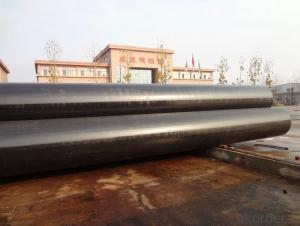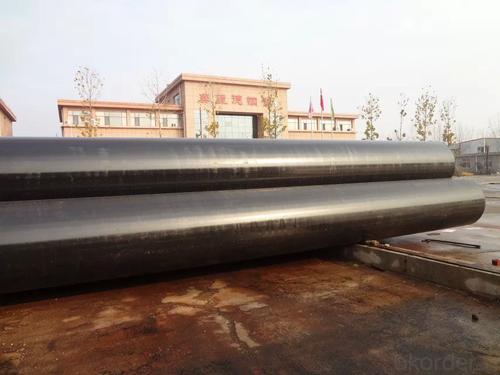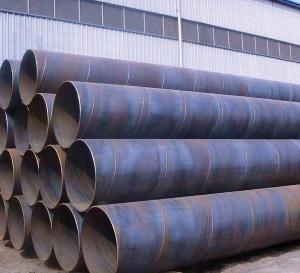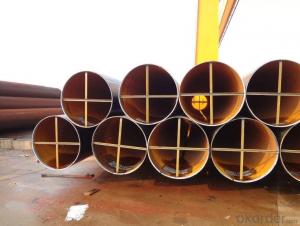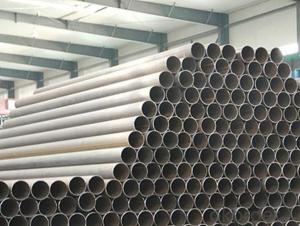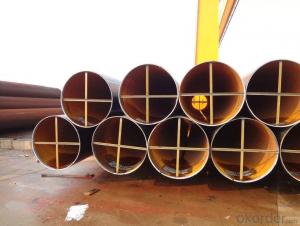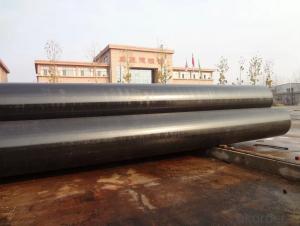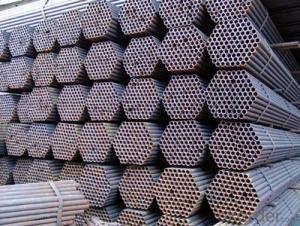Longitudinal Submerged Arc Welded Pipe Q235/Q345
- Loading Port:
- Tianjin
- Payment Terms:
- TT or LC
- Min Order Qty:
- 40 m.t.
- Supply Capability:
- 12000 m.t./month
OKorder Service Pledge
OKorder Financial Service
You Might Also Like
1、Structure of Longitudinal Submerged Arc Welded Pipe Q235/Q345:
Welded Steel Tube is widely applied to line pipe and casing and tubing in oil transportation and casing field, and it is used in Low,high pressure liquid and gassy transportation and it is also good Structure pipe (for furniture, window, door, building , bridge, mechanical etc).
It is formed by drawing a solid billet over a piercing rod to create the hollow shell. We are company that have many years experience and professional manager team and engineer team and sales team, sure we will provide you high quality of welded pipe and professioanl service.
2、Main Features of Longitudinal Submerged Arc Welded Pipe Q235/Q345:
• High manufacturing accuracy
• The higher strength
• The small inertia resistance
• Strong heat dissipation ability
• Good visual effect
• Satisfy price
3、Longitudinal Submerged Arc Welded Pipe Q235/Q345 Specification:
Standard | GB, DIN, ASTM ASTM A106-2006, ASTM A53-2007 |
Grade | 10#-45#, 16Mn 10#, 20#, 45#, 16Mn |
Thickness | 8 - 33 mm |
Section Shape | Round |
Outer Diameter | 133 - 219 mm |
Place of Origin | Shandong, China (Mainland) |
Secondary Or Not | Non-secondary |
Application | Hydraulic Pipe |
Technique | Cold Drawn |
Certification | API |
Surface Treatment | factory state or painted black |
Special Pipe | API Pipe |
Alloy Or Not | Non-alloy |
Length | 5-12M |
Outer Diameter | 21.3-610mm |
Grade | 20#, 45#, Q345, API J55, API K55, API L80, API N80, API P110, A53B |
Standard | ASME, ASTM |
1) Material:20#(ASTM A 106/A53 GRB.API5LGRB,GB),45#,16Mn,10#.
2) Specification range:OD:21.3-610mm,WT:6-70mm,length:6-12m or according to the requirement of clients.
3) Excutive standards:GB,ASME API5L.ASTM A 106/A53,Despite of the above standards,we can also supply seamless steel pipe with standard of DIN,JIS,and so on,and also develop new products according to the requirements of our clients!
4) Surface:black lacquered,varnish coating or galvanized.
4、Packaging & Delivery
Packaging Details: | seaworthy package,bundles wrapped with strong steel strip |
Delivery Detail: | 15-30days after received 30%TT |
5、FAQ of Longitudinal Submerged Arc Welded Pipe Q235/Q345:
①How is the quality of your products?
Our products are strictly in accordance with international and domestic standard. We test on every pipe before delivery. Any quality certification or testing report you want to see, please tell us.
Guaranteed: If products’ quality is not in accordance with description as we provide or the promise before you place order, we promise 100% refund.
②How about the price?
Yes, we are factory and be capable of offering you the lowest price. One of our policy is that “ to save time and be absolutely honest with our business relationship, we quote as low as possible for every client, and discount can be given according to the quantity”, if you are interested in bargain and dissatisfy our factory price, just don’t waste your time. Our quotation is professional.
6、 Longitudinal Submerged Arc Welded Pipe Q235/Q345 Images:
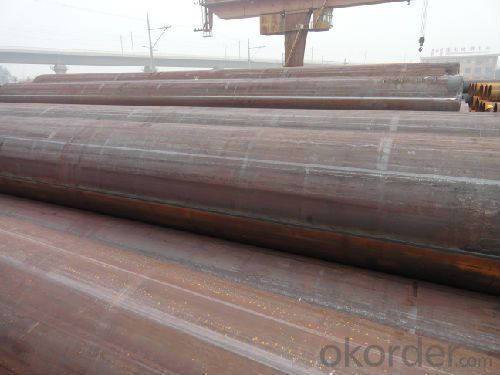
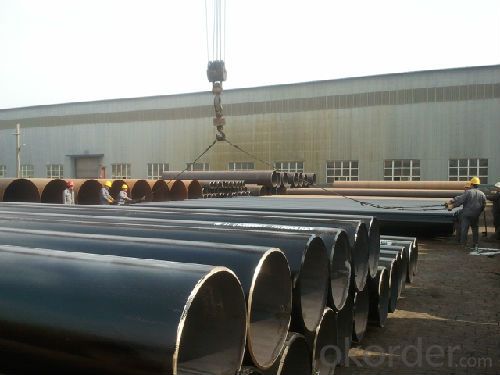
- Q: What are the common uses of stainless steel pipes?
- Various industries widely use stainless steel pipes for numerous purposes. Some common applications of these pipes include: 1. Plumbing and Water Supply: Stainless steel pipes are popularly utilized in residential, commercial, and industrial plumbing systems due to their resistance against corrosion, durability, and capacity to handle high-pressure situations. They are also employed in water treatment plants and wastewater management systems. 2. Oil and Gas Industry: The oil and gas industry extensively relies on stainless steel pipes for the transportation of oil, gas, and other fluids. These pipes can endure high temperatures, pressure, and corrosive environments, making them ideal for this sector. 3. Food and Beverage Industry: The food and beverage industry frequently employs stainless steel pipes because of their hygienic properties and ability to resist corrosion. These pipes are commonly used for the transportation of liquids, gases, and food products in processing plants, breweries, wineries, dairies, and other food-related facilities. 4. Chemical and Petrochemical Industry: Stainless steel pipes play a critical role in the chemical and petrochemical industry, where they are utilized for transporting corrosive chemicals, acids, and other hazardous substances. The pipes' resistance to corrosion and high temperatures makes them suitable for these demanding applications. 5. Construction and Architecture: Stainless steel pipes are utilized in construction and architecture for various purposes such as providing structural support, creating handrails, guardrails, and decorative elements. Their strength, durability, and aesthetic appeal make them a popular choice in contemporary architectural designs. 6. Automotive and Transportation: The automotive industry relies on stainless steel pipes for exhaust systems, fuel lines, and other components that require resistance to high temperatures and corrosion. These pipes are also used in the transportation of fluids and gases in ships, trains, and airplanes. 7. Pharmaceutical Industry: The pharmaceutical industry necessitates high-quality materials that adhere to stringent sanitary standards. Stainless steel pipes are commonly used in pharmaceutical manufacturing processes for transporting liquids, gases, and chemicals due to their cleanability, resistance to corrosion, and compatibility with pharmaceutical products. 8. Power Generation: Stainless steel pipes find applications in power plants, both conventional and renewable, for various purposes such as steam lines, condensers, and heat exchangers. These pipes are selected for their ability to withstand high temperatures, pressure, and corrosive environments. In conclusion, stainless steel pipes have a wide range of applications in various industries, including plumbing, oil and gas, food and beverage, chemical and petrochemical, construction, automotive, pharmaceutical, and power generation. Their resistance to corrosion, durability, and ability to handle high temperatures and pressure make them a versatile and reliable choice for numerous industrial applications.
- Q: What is the difference between internal and external coating of steel pipes?
- The main difference between internal and external coating of steel pipes lies in the purpose and location of the coatings. The internal coating is applied on the inner surface of the steel pipe to protect it from corrosion and ensure smooth flow of the contents within the pipe. It is commonly used to prevent contamination of the transported liquid or gas and to extend the lifespan of the pipe. On the other hand, the external coating is applied on the outer surface of the steel pipe to protect it from environmental factors such as moisture, chemicals, and physical damage. It helps to prevent corrosion and maintain the structural integrity of the pipe, especially in harsh conditions. Overall, while the internal coating focuses on the functionality and preservation of the transported contents, the external coating primarily aims at safeguarding the pipe itself from external influences.
- Q: How are steel pipes used in the construction of stormwater drainage systems?
- Steel pipes are commonly used in the construction of stormwater drainage systems due to their durability and strength. They serve as underground conduits to efficiently transport stormwater away from built-up areas, preventing flooding and water damage. Steel pipes offer high resistance to external pressure and are capable of withstanding heavy loads, making them suitable for underground installations. Additionally, their corrosion-resistant properties ensure long-term effectiveness and minimize maintenance requirements. Overall, steel pipes are essential components in stormwater drainage systems, providing reliable and efficient water management solutions.
- Q: What are the different types of joints used to connect steel pipes?
- There are several types of joints commonly used to connect steel pipes, including threaded joints, flanged joints, welded joints, and mechanical joints. Each type of joint has its own advantages and is chosen based on factors such as the application, pipe size, and pressure requirements.
- Q: How do you calculate the flow rate of water in steel pipes?
- To calculate the flow rate of water in steel pipes, you need to know the pipe diameter, length, and the pressure difference between the inlet and outlet. By using the Darcy-Weisbach equation or other relevant hydraulic formulas, you can determine the flow rate based on these parameters.
- Q: Can steel pipes be used for bridge piling?
- Yes, steel pipes can be used for bridge piling. Steel pipes are commonly used in bridge construction due to their strength, durability, and resistance to corrosion. They provide sufficient load-bearing capacity and can be driven deep into the ground to provide stable support for bridges.
- Q: What are the advantages of using steel pipes in construction?
- There are several advantages of using steel pipes in construction. Firstly, steel pipes are incredibly strong and durable, providing excellent structural integrity and long-term reliability. They can withstand high pressure and heavy loads, making them suitable for various applications such as water and gas transportation, oil pipelines, and building frameworks. Secondly, steel pipes have a high resistance to corrosion, which ensures longevity and reduces maintenance costs. Additionally, steel pipes are versatile and can be easily customized to meet specific project requirements, as they come in various sizes, shapes, and thicknesses. Lastly, steel pipes are environmentally friendly, as they are recyclable, reducing the overall carbon footprint of construction projects.
- Q: How are steel pipes used in the manufacturing of hydraulic systems?
- Steel pipes are commonly used in the manufacturing of hydraulic systems due to their strength, durability, and resistance to high pressure. These pipes act as conduits to transport hydraulic fluid, allowing the system to transfer power and control the movement of machinery. The steel pipes provide a reliable and leak-free connection, ensuring efficient and safe operation of the hydraulic system.
- Q: Steel pipe is particularly long, how to clean the inner wall of the pipe so that it can be thoroughly cleaned
- High cleanliness requirements for ultrasonic cleaningUltrasonic cleaning principle: the pressure change of ultrasonic wave propagation in the liquid in the liquid cavitation phenomenon strongly, per second produced millions of tiny gas bubbles, these bubbles rapidly in large pressure under the action of not following the violent explosion, impact force and produce strong suction, enough to make the stubborn dirt quickly stripped.
- Q: Can steel pipes be used for underground chemical injection?
- Yes, steel pipes can be used for underground chemical injection. Steel pipes are known for their durability and corrosion resistance, making them suitable for various applications, including underground chemical injection. However, it is also important to consider the type of chemical being injected and verify if steel pipes are compatible with the specific chemical to avoid any potential reactions or degradation.
Send your message to us
Longitudinal Submerged Arc Welded Pipe Q235/Q345
- Loading Port:
- Tianjin
- Payment Terms:
- TT or LC
- Min Order Qty:
- 40 m.t.
- Supply Capability:
- 12000 m.t./month
OKorder Service Pledge
OKorder Financial Service
Similar products
Hot products
Hot Searches
Related keywords
